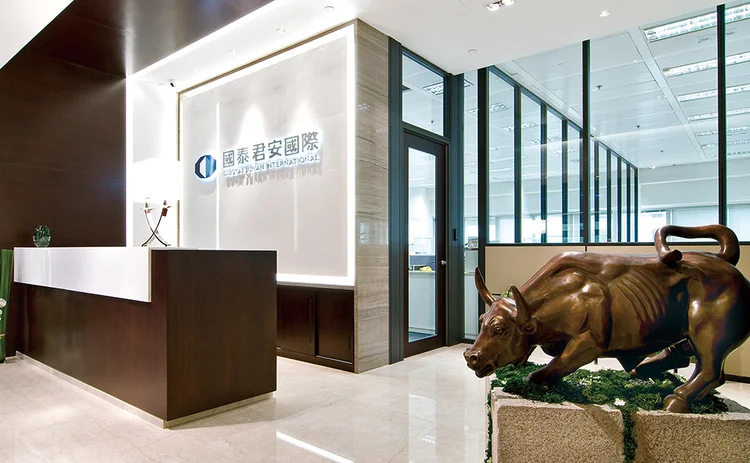
This article was paid for by a contributing third party.More Information.
Structured products gain favour among Chinese enterprises

The Chinese government’s flagship national strategy for the advancement of regional connectivity – the Belt and Road Initiative (BRI) – continues to encourage the outward expansion of Chinese state-owned enterprises (SOEs). Here, Guotai Junan International describes how it can assist SOEs by matching the liability-driven goals of finance officers overseas with those of yield-hungry investors in China
Growing pains along the road of expansion

Chinese SOEs are undergoing a significant transformation. Many are expanding overseas, setting up subsidiaries in countries in Africa, eastern Europe, South America and South‑east Asia in line with the BRI – the Chinese government’s national strategy to enhance regional connectivity.
As of December 2019, SOEs had more than 11,000 offshore units and total assets exceeding CNY7.98 trillion ($1.1 trillion). Collectively, they oversee in excess of 3,400 major projects in construction, energy resources development and international co‑operation – and have become important emissaries of China’s diplomatic and economic might in the process.
This growth spurt poses a unique set of challenges to SOE corporate treasurers. The sprawling scale of SOE operations means it makes sense for treasury functions to be located within a single offshore centre to facilitate the supply of credit to BRI clients, and optimise the allocation of funds between group entities.
However, strict post-financial crisis rules, coupled with pressure on the renminbi caused by the tension between US and China, place restrictions on the amount of equity an SOE can channel out of the mainland and into these offshore centres. With only a sliver of capital to back operations, these entities then struggle to obtain the high credit ratings necessary to issue debt, which is needed at scale to fund their network of BRI enterprises.
Equity solutions for SOEs

Enter Guotai Junan International (GTJAI). The Hong Kong-based market leader and the first Chinese securities company to break out onto the international stage has developed a suite of structured solutions to assist SOEs – particularly their offshore treasury centres – by matching the liability-driven goals of finance officers overseas with those of yield-hungry investors within China.
“What we do is help treasury centres boost their equity, so they have a solid equity base. Then banks are willing to lend more to them, knowing there is a larger cushion of subordinated liabilities below their own claims,” says Sabrina Wang, executive director and head of sales in the equity derivatives department at GTJAI.
The firm has pioneered a solution that facilitates the issuance of preference shares by an offshore treasury centre to external investors. By enlarging their equity base, the treasury centres’ balance sheets are strengthened – making it a more attractive investor prospect for debt investors.
Through this process, an SOE treasury centre is able to leverage its assets on a large scale, without compromising the equity stake of its SOE parent or sacrificing its operational independence. This is because the preference shares do not endow the holders with ownership rights.
This structure fulfils the needs of all participants. The preferred shares’ investors do not have voting rights, meaning the Chinese government’s investment is not influenced. The offshore treasury centre gets a burnished credit rating to facilitate debt financing, while investors gain access to a bond-like investment that pays an enhanced coupon – typically 300–600 basis points above the risk-free rate, subject to credit enhancement covenants.
GTJAI leverages its broad network of offshore and onshore expertise to handle these complex deals, led by an equity derivatives team that cut its teeth working at international investment banks. Currently, the firm will typically take down all the preference shares issued by a treasury centre and then parcel them out to interested investors – predominantly other financial institutions.
GTJAI’s familiarity with the intricacies of SOE operations is a distinct advantage in this space. Financial officers within these entities are risk-averse and have to operate within a byzantine government bureaucracy. GTJAI is able to work with the SOE treasurer to go through the process of a share issue and address concerns as they arise.
These relationships with SOEs also help improve the product for the end-investor. “We have a deep understanding of these SOEs, and converse with the senior management of these firms to acquire credit support for their treasury centres. The credit support gives investors’ confidence as to the credit risk they take on when buying these preference shares,” says Wang. GTJAI can also provide leverage to end-investors.
More solutions tailored to the needs of corporates and institutions
GTJAI is also a regional leader in offering structured products for Chinese institutions seeking to diversify their asset mix. Long the go-to house for foreign exchange, rates and equity derivatives, the firm has broadened its product offering to include short-duration liquid alternatives and private equity (PE)-based investments.
“As a Chinese securities house, we understand better the needs of Chinese corporations, and they are more comfortable working with us as we are more flexible and efficient,” says Minna Liao, executive director and senior equity derivatives structurer at GTJAI.
Unlike other structured products market participants, GTJAI focuses on bespoke investments that cater to clients’ specific needs, as well as innovative solutions. This emphasis on customised products has allowed the firm to build deep relationships with its clients, which have in turn opened up opportunities to develop increasingly tailor-made investments to aid their growth and strategic planning.
For example, in recent years GTJAI has specialised in solutions that monetise companies’ holdings in illiquid PE shares. Chinese institutions have piled into PE to escape the volatility of public markets and tap the high-yield opportunities in this space. However, when an institution invests as a limited partner, it cannot access the returns on its investment until the fund disburses the proceeds. In the interim, the investment takes up valuable space on-balance sheet.
One solution offered by GTJAI sees clients transfer their interest in a PE fund to a special-purpose vehicle (SPV). The SPV then issues notes split into senior and junior tranches. The client retains most of the junior notes, while GTJAI buys up the senior tranche using its own account or sells these on to other investors.
This way, the client is able to offload up to 60% of its PE investment, receiving cash for the remainder through the sale of the senior tranches while retaining most of the potential profit and loss from the PE returns through its ownership of the junior notes. Its only cost is the fixed coupon paid to the senior-tranche investors. For their part, GTJAI and its other senior-tranche investors receive a steady stream of income from the senior notes, along with custody of the underlying PE assets – a win-win outcome.
“Relationships and co‑ordination are key to these deals, as the client isn’t the only one invested in these PE funds. There are other limited partners, the general partner along with other stakeholders, and we need to co-operate with all of them,” says Liao.
Another recent innovative solution saw GTJAI offer clients a forward hedge on publicly traded shares held in a private fund. As the liquidation of fund takes time, GTJAI offers the client a helpful solution to either obtain financing on these illiquid assets or indirectly cash out when the stock is performing well.
In a typical transaction, clients will pledge their fund units to GTJAI, which will then borrow the public shares from market participants and sell them forward, fixing their price for the duration of the fund. The proceeds of the sale are then loaned to the client, with the fund units acting as collateral. Because the forward sale is perfectly hedged by the corresponding shares in the fund, GTJAI is spared mark-to-market volatility from its position.
“Because we are covered by this collateral, we can offer the client leverage on these shares – with a loan-to-value ratio as high as 80%,” says Wang.
Such structured products are a high-touch business. The relationships built up over many years of partnership, coupled with its deep expertise of the Chinese corporate arena, mean GTJAI is particularly well placed to tailor these solutions.
“We know the dynamics of the Chinese market, being an SOE ourselves,” says Wang. “That allows us to act quickly and adapt to our clients’ needs.”
Sponsored content
Copyright Infopro Digital Limited. All rights reserved.
As outlined in our terms and conditions, https://www.infopro-digital.com/terms-and-conditions/subscriptions/ (point 2.4), printing is limited to a single copy.
If you would like to purchase additional rights please email info@risk.net
Copyright Infopro Digital Limited. All rights reserved.
You may share this content using our article tools. As outlined in our terms and conditions, https://www.infopro-digital.com/terms-and-conditions/subscriptions/ (clause 2.4), an Authorised User may only make one copy of the materials for their own personal use. You must also comply with the restrictions in clause 2.5.
If you would like to purchase additional rights please email info@risk.net
